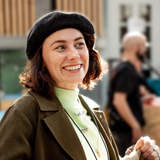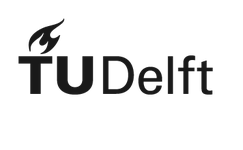Since DCODE – a European-funded network that trains researchers and designers to guide society’s digital transformation towards inclusive, sustainable futures – began in 2020, the landscape of designing for digital futures has evolved significantly. With technologies still maturing and societal movements on the rise, how do we stay on track and up-to-date when reimagining what it means to design with AI in the context of today’s and tomorrow’s challenges? Join us to explore these questions at our upcoming talks & exhibition, featuring innovative work from DCODE PhD candidates.
Can creativity contribute to left-brain designed technology? How do we make AI inclusive? How can we have a say in current digital developments? After 4 years of hard work, our DCODE PhD candidates are proud to present to you their work in this exhibition on designing for better digital futures. It is a mix of physical and digital artefacts of our DCODE researchers. Below you can find more information.
Join us at this event as we explore current developments and share hopeful, critical perspectives on AI design with esteemed speakers Alessandro Bozzon (Professor – Delft University of Technology), Nadia Piet (Founder – AIxDesign), and pitches of our DCODE researchers!
Can creativity contribute to left-brain designed technology? How do we make AI inclusive? How can we have a say in current digital developments? After 4 years of hard work, our DCODE PhD candidates are proud to present to you their work in this exhibition on designing for better digital futures. It is a mix of physical and digital artefacts of our DCODE researchers. Below you can find more information.
About the exhibition
- Adaptive personalization framework for enhancing mobility experience of vulnerable users – Francesco Maria Turn
- The User Is Present – Yuxi Liu
- Sounding Territories: Disidentification and (re)attuning with simulation models – Grace Turtle
- Interfaces for AI – Tweaking Neural Networks – Rob Collins
- Data Dilemmas: tomatoes, humans, machines and capitalism – Youngsil Lee & Margherita Soldati
- Physical approaches to Cosmovision – Carlos Guerrero Millan
- Prompting Data Fabulations – Pamela Gil Salas
- ToSbeats in the making – Seda Özçetin
You don’t need a reservation for the exhibition. You can just come and check it out!
About the talks
- Designing AI: How far will we go? – Alessandro Bozzon
- We live in a world where it is almost impossible not to interact with AI algorithms and systems designed to make our life easier. While the technology seems be unlimited, how intrusive do we want it to be? Do you trust it to automate your online grocery shopping? Or to replace our teachers at schools? Alessandro will give us a short introduction to his work on designing AI for good.
- Kaleidoscopic views on AI and Design – Nadia Piet
- Better travel recommendations, energy saving at our homes, facial detection in our photos app: we’re all familiar with these straightforward examples of AI in the context of “efficiency” and techno-solutionism. But beyond big tech headlines and techno-solutionism, what alternative lenses can we adopt both onto and through AI? What other narratives can inspire us in the ways we look at, relate to, and design AI? What unlikely perspectives or sources can we draw inspiration from, to move past the hype and hate? Esoteric, Queer, Ancestral, and Slow AI – in this short conversation Nadia will take us on a field trip through a handful of examples, projects, and provocations she is working on with her community to shift the ways we think and talk about AI.
- Hopeful & critical perspective – Pitches DCODE team
- Why is it so hard to make algorithmic recommendations that are in people’s interest? – Pamela Gil Salas (Umeå University)
- Is putting everything in big data, like creating digital twins, really smart? –Youngsil Lee (University of Edinburgh)
- Is talking about ethics in AI blocking the progress? – Sonja Rattay (University of Copenhagen)
- What can we do if we don’t agree with technology? – Rob Collins (Umeå University)
- Shaping (unpredictable) futures: Who shapes the future: you, or the AI models you use? – Grace Turtle (Delft University of Technology)
- Why is it important that we rethink how we relate to technology? – Seda Özçetin (Umeå University)
About the speakers
Alessandro Bozzon – Delft University of Technology
He is a professor of Human-Centered Artificial Intelligence at the Faculty of Industrial Design Engineering (Delft University of Technology). His research lies at the intersection of human-computer interaction, human computation, user modeling, and machine learning. He is interested in developing methods and tools of AI-enabled systems around actual human characteristics.
Nadia Piet – AIxDesign Community
She is an independent researcher, designer, and cultural producer with a focus on (critical) AI, (digital) culture, technology, creativity, and participatory practices. She is the founder and creative lead of AIxDESIGN, faculty at ELISAVA, mentor at NEW INC, holds an MA in Data-Driven Design, and works on freelance and self-initiated projects that probe and sense-make how we shape technology and it shapes us in return.
Wing Yan Man – Delft University of Technology & 3310 – School for Millennials
For the past years she has been working at the Faculty of Industrial Design Engineering as Program Coordinator AI and as Creative Director & Curator of TU Delft’s first Dutch Design Week exhibition in 2023. Additionally, she has founded 3310 – School for Millennials to create awareness with trainings and events on mental health and diversity & inclusion among the younger generation and companies working with this generation.
About DCODE
DCODE is a European-funded network and a program with 15 PhDs. We train researchers and designers to guide society’s digital transformation towards inclusive, sustainable futures. This network consists of research partners Delft University of Technology, Umeå Institute of Design, The University of Edinburgh, University of Copenhagen, Aarhus University, Transport and Telecommunication Institute and Amsterdam University of Applied Sciences. Other partners are Amsterdam Institute for Advanced Metropolitan Solutions, MyTomorrows, Philips, Advanced Care Research Centre, Open Future, LucidMinds, ClearboxAI, BBC and Leiden University Medical Center.
Read more information about DCODE here.






